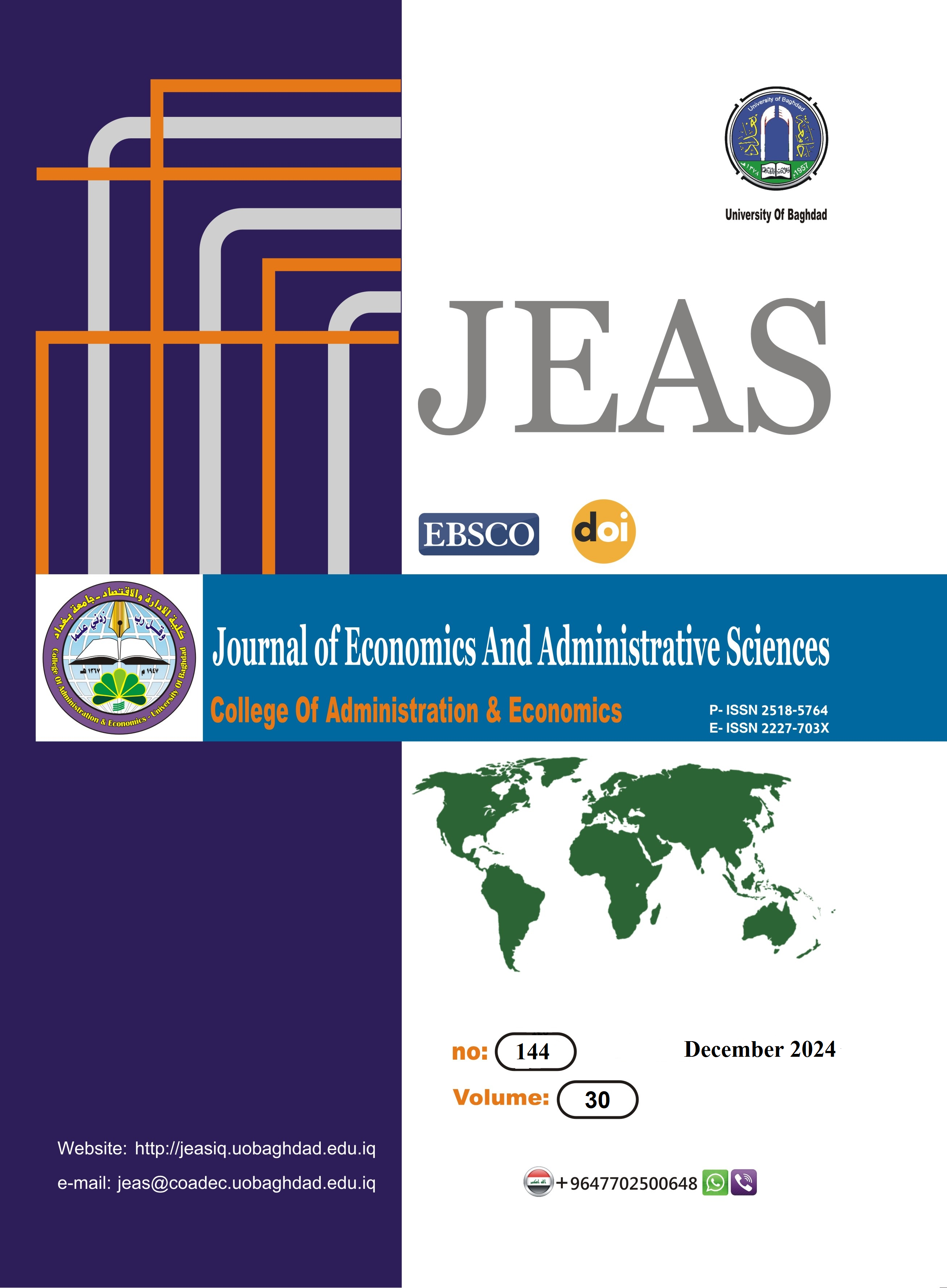The Impact of Customer Capital on Enhancing the Work Environment: An Analytical Study At Rafidain Bank, Anbar And Fallujah Branches
DOI:
https://doi.org/10.33095/mzprgp14Keywords:
Customer Capital , Work Environment,Rafidain Bank, Anbar And Fallujah BranchesAbstract
Purpose: This research works to achieve several goals, perhaps the most prominent of which is diagnosing the extent of the bank under study’s interest in applying customer capital and the work environment within it and exploiting the relationship that brings together the variables.
Theoretical Framework: Based on what the researchers (Zahedi and Lapierre) mentioned, this study addresses the lack of use of marketing intelligence tools, the lack of investment in information technology, the lack of continuous updating of data, and keeping pace with developments in the external environment.
Design/Methodology/Approach: The study analyzed data in banks between the Anbar and Fallujah branches (2023-2024), using the customer capital model and through its three dimensions (marketing intelligence, customer satisfaction, and customer loyalty) and their role in enhancing the work environment and its dimensions (marketing intelligence, customer loyalty, customer satisfaction, organizational chart, regulations and instructions, incentives and rewards, and working conditions).
Findings: The results highlighted the presence of an influential relationship between client capital in enhancing the work environment
Research Implications: The results confirm that there is a weakness in the customer loyalty process, and this is due to the failure to use an appropriate and effective strategy that helps it in the process of competing with banks and making appropriate decisions to face competitive challenges.
Originality/Value: This study works to identify the shortage of human resources, which leads to the difficulty of providing services to its customers according to their desires and needs. The bank should invest in technological infrastructure and modernize systems to provide advanced banking services.
JEL Classification: M10, M12, M15, M19.
Downloads
References
Alkitbi, S. S., Alshurideh, M., Al Kurdi, B., & Salloum, S. A. (2021). Factors Affect Customer Retention: A Systematic Review. Advances In Intelligent Systems And Computing, 1261 Aisc, 656–667. https://Doi.Org/10.1007/978-3-030-58669-0_59
Basari, M. A. M. D., & Shamsudin, M. F. (2020). Does customer satisfaction matters?. Journal of Undergraduate Social Science and Technology, 2(1).
Cottini, E., & Lucifora, C. (2013). Mental health and working conditions in Europe. ILR Review, 66(4), 958-988.
Dam, S. M., & Dam, T. C. (2021). Relationships Between Service Quality, Brand Image, Customer Satisfaction, And Customer Loyalty. Journal Of Asian Finance, Economics And Business, 8(3), 585–593. https://Doi.Org/10.13106/Jafeb.2021.Vol8.No3.0585
Dou, W. W., Ji, Y., Reibstein, D., & Wu, W. (2021). Inalienable Customer Capital, Corporate Liquidity, And Stock Returns. Journal Of Finance, 76(1), 211–265.
https://Doi.Org/10.1111/Jofi.12960
Erina, J., & Lace, N. (2011). Needs for customer capital in banks. In Knowledge Society Institute International Conference «IV International Science Conference «Knowledge Society», V International Science Conference for Young Researchers «Technical Science and Industrial Management (pp. 38-41).
Evangelista, F., & Mac, L. (2016). The Influence Of Experience And Deliberate Learning On Sme Export Performance. International Journal Of Entrepreneurial Behaviour And Research, 22(6), 860–879. https:/Doi.Org/10.1108/Ijebr-12-2015-0300
Falahat, M., Ramayah, T., Soto-Acosta, P., & Lee, Y. Y. (2020). SMEs internationalization: The role of product innovation, market intelligence, pricing and marketing communication capabilities as drivers of SMEs’ international performance. Technological forecasting and social change, 152, 119908. https://Doi.Org/10.1016/J.Techfore.2020.119908
Cahaya, Y. F., Siswanti, I., Putra, Y. M., & Pattiwael, A. C. (2023). Contributions to Customer Satisfaction from Product Quality, Promotion and Price. Journal of Economics, Finance and Management Studies, 6(6), 2434-2440. https://Doi.Org/10.47191/Jefms/V6-I6-02
Lunenburg, F. C. (2017). Organizational Structure and Design. Journal of Educational Leadership and Policy Studies, 1(1), 21-43.
Fu, Q., Rahman, A. A. A., Jiang, H., Abbas, J., & Comite, U. (2022). Sustainable Supply Chain And Business Performance: The Impact Of Strategy, Network Design, Information Systems, And Organizational Structure. Sustainability (Switzerland), 14(3).
https://Doi.Org/10.3390/Su14031080
Gebhardt, G. F., Farrelly, F. J., & Conduit, J. (2019). Market Intelligence Dissemination Practices. Journal Of Marketing, 83(3), 72–90.
https://Doi.Org/10.1177/0022242919830958
Gray, G. C., & Silbey, S. S. (2014). Governing Inside The Organization: Interpreting Regulation And Compliance. American Journal Of Sociology, 120(1), 96–145.
https://Doi.Org/10.1086/677187
Hasanah, U. (2022). Negative Work Psychology Perspective and Work Environment on Performance. PRODUKTIF: Jurnal Kepegawaian dan Organisasi, 1(1), 19-27.
Jamil, G. L. (2013). Approaching Market Intelligence Concept Through A Case Analysis: Continuous Knowledge For Marketing Strategic Management And Its Complementarity To Competitive Intelligence. Procedia Technology, 9, 463–472.
https://Doi.Org/10.1016/J.Protcy.2013.12.051
Khairawati, S. (2019). Effect Of Customer Loyalty Program On Customer Satisfaction And Its Impact On Customer Loyalty. International Journal Of Research In Business And Social Science (2147- 4478), 9(1), 15–23. https://Doi.Org/10.20525/Ijrbs.V9i1.603
Knudsen, H., Busck, O., & Lind, J. (2011). Work Environment Quality: The Role Of Workplace Participation And Democracy. Work, Employment And Society, 25(3), 379–396. https://Doi.Org/10.1177/0950017011407966
Kurdi, B. Al, Alshurideh, M., & Alnaser, A. (2020). The Impact Of Employee Satisfaction On Customer Satisfaction: Theoretical And Empirical Underpinning. Management Science Letters, 10(15), 3561–3570. https://Doi.Org/10.5267/J.Msl.2020.6.038
Leninkumar, V. (2017). The Relationship Between Customer Satisfaction And Customer Trust On Customer Loyalty. International Journal Of Academic Research In Business And Social Sciences, 7(4). https://Doi.Org/10.6007/Ijarbss/V7-I4/2821
Maharani, T., & Fuad, K. (2020). The Effect Of Human Capital, Structural Capital, Customer Capital, Managerial Ownership, And Leverage Toward Profitability Of Company. Journal Of Advanced Multidisciplinary Research, 1(1), 46.
https://Doi.Org/10.30659/Jamr.1.1.46-62
Manyisa, Z. M., & Van Aswegen, E. J. (2017). Factors Affecting Working Conditions In Public Hospitals: A Literature Review. In International Journal Of Africa Nursing Sciences (Vol. 6, Pp. 28–38). Elsevier Ltd. https://Doi.Org/10.1016/J.Ijans.2017.02.002
Molinillo, S., Aguilar-Illescas, R., Anaya-Sánchez, R., & Carvajal-Trujillo, E. (2022). The Customer Retail App Experience: Implications For Customer Loyalty. Journal Of Retailing And Consumer Services, 65. https://Doi.Org/10.1016/J.Jretconser.2021.102842
Parasuraman, A., Ball, J., Aksoy, L., Keiningham, T. L., & Zaki, M. (2021). More than a feeling? Toward a theory of customer delight. Journal of Service Management, 32(1), 1-26. https://Doi.Org/10.1108/Josm-03-2019-0094
Pranoto, Y. H. (2022, June). Overviewing ecological mindedness in Indonesian education: From regulation to instructions. In English Language and Literature International Conference (ELLiC) Proceedings (Vol. 5, pp. 343-349).
Sakka, S. El. (2018). Impact Of Green Human Resource Management (Ghrm) Practices On Enhancing Supply Chain Image And Performance. Global Journal Of Human Resource Management, 6(3), 2053–5694.
Putra, A. S., Waruwu, H., Asbari, M., Novitasari, D., & Purwanto, A. (2020). Leadership in the innovation era: Transactional or transformational style?. International Journal of Social and Management Studies, 1(1), 89-94.
Toropova, A., Myrberg, E., & Johansson, S. (2021). Teacher Job Satisfaction: The Importance Of School Working Conditions And Teacher Characteristics. Educational Review, 73(1), 71–97. https://Doi.Org/10.1080/00131911.2019.1705247
Wahyuni, S., MM, K. S., Muammar, D., & MM, S. S. (2023). Pengaruh Kepemimpinan dan Lingkungan Kerja Terhadap Kepuasan Kerja Karyawan. Pengaruh Kepemimpinan Dan Lingkungan Kerja Terhadap Kepuasan Kerja Karyawan, 5(4), 723-734.
Published
Issue
Section
License
Copyright (c) 2024 Journal of Economics and Administrative Sciences

This work is licensed under a Creative Commons Attribution-NonCommercial-NoDerivatives 4.0 International License.
Articles submitted to the journal should not have been published before in their current or substantially similar form or be under consideration for publication with another journal. Please see JEAS originality guidelines for details. Use this in conjunction with the points below about references, before submission i.e. always attribute clearly using either indented text or quote marks as well as making use of the preferred Harvard style of formatting. Authors submitting articles for publication warrant that the work is not an infringement of any existing copyright and will indemnify the publisher against any breach of such warranty. For ease of dissemination and to ensure proper policing of use, papers and contributions become the legal copyright of the publisher unless otherwise agreed.
The editor may make use of Turtitin software for checking the originality of submissions received.


























